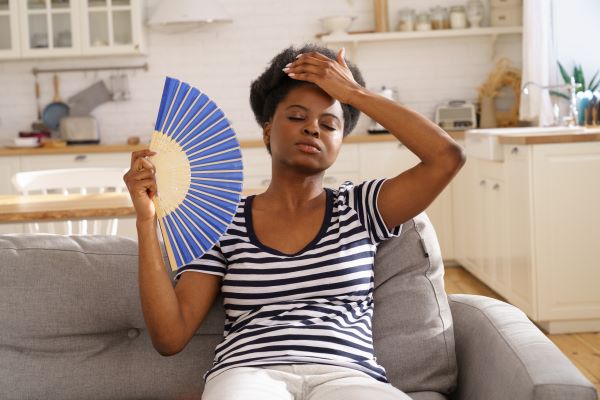All Weather Heating & Cooling has been in the HVAC business for more than 25 years. When you’ve been in any business for that long, you start to anticipate patterns and trends and predict what each season will be like. For example, right around this time of year, we expect to start fielding a lot of emergency calls from homeowners experiencing problems with their AC not cooling.
We understand how important it is for people to be able to stay safe from the heat by taking refuge in the comfort of their air-conditioned homes. If your air conditioner isn’t working optimally, it’s more than just an inconvenience. It can be dangerous, particularly during sustained heatwaves.
The purpose of this post is to help you identify problems with your AC unit and troubleshoot them if you can. We’ll also discuss when it’s time to pick up your phone, call your trusted HVAC professional, and tell them, “Help! My AC is not cooling!”
Problem #1: Poor Air Circulation
When we get calls about an AC not cooling, the problem can take several forms. Sometimes, an AC not cooling means nothing is happening at all: the system simply isn’t functioning, and no cool air is being produced.
In most cases, however, the system is working; it’s just not cooling effectively. For example, you might notice that your compressor is working just fine, but for some reason, the cool air isn’t going where it’s supposed to.
If the air isn’t circulating through your house properly, it doesn’t matter how well the hardware works. The rooms won’t cool down.
Solution
Keep your ducts clean, change air filters regularly, and repair any leaks that occur. Ideally, you should have your HVAC professional perform a maintenance visit at least once a year or so, during which time they can ensure there’s nothing blocking airflow throughout your home.
Problem #2: The Thermostat Is Malfunctioning
The thermostat is the control panel for your air conditioning unit. When you enter the temperature you want, it’s the thermostat that communicates with the rest of the system and tells the AC unit to cycle on or off, depending on the need.
If you decide you want it to be cooler, you turn the thermostat down, and the air conditioner cycles on until it reaches that temperature. If anything goes wrong during the process, however, your air conditioner won’t be able to do its job effectively. It will either fail to turn on when it needs to, leaving you sweating, or it may cycle on too often, driving your energy bill way up.
Solution
There are a number of problems that can cause an issue with the thermostat. Start by checking out the area around the thermostat. If it’s getting hit with direct sunlight or in a space that doesn’t get much airflow, it could be reading higher or lower temperatures than you’re actually experiencing. Close the curtain or improve the airflow to get better accuracy.
Another common culprit with a thermostat that isn’t working properly is a faulty electrical connection. Since electrical work in the home should always be performed by a licensed professional, contact your HVAC technician if you suspect your AC unit may require it.
Problem #3: The Compressor Is Leaking Coolant
Air conditioners can do what they do thanks to a nifty quirk in the laws of physics: namely, when high-pressure refrigerant gases expand, they also become significantly colder. This means that your AC unit depends on two things:
- Having plenty of refrigerant
- Being able to keep that refrigerant under pressure
There are several ways you can determine if a refrigerant leak is responsible for your AC not cooling. You might hear a hissing sound coming from the outside of the unit (that’s the pressurized gas escaping). You might also notice that your condenser coils have become covered in ice, a consequence of the heat not being transferred out of them properly.
The problem may not always be so obvious: sometimes, you’ll only notice an issue when you get your monthly energy bill and discover you’ve been spending extra on your cooling.
Solution
You’ll probably need to have the damaged parts replaced and the refrigerant refilled. While your HVAC professional may be able to plug a smaller leak, that’s usually a temporary fix. Eventually, the leak will return unless you opt to have the weakened refrigerant coils replaced entirely.
Note that any work dealing with refrigerants requires specialty training so that the chemicals are handled safely. Be sure to contact a licensed professional.
Problem #4: Your Air Conditioner Might Just Be Too Old
If it’s properly cared for, a well-built air conditioner can last for many years, even decades. This assumes, of course, that the homeowner has invested in regular preventative maintenance, including replacing filters and repairing any damage that occurs over time.
However, nothing lasts forever, and even the best AC units will eventually need to be replaced. If you notice that your air conditioner doesn’t seem to be cooling your home as well as it used to, there may not be a single problem you can point to. Instead, it may be the typical system failure that comes with age.
Solution
Purchase a new one!
After a certain point, repairing an AC unit that is past its useful life span will no longer be a cost-effective choice. Repairs essentially become band-aids: they might provide temporary relief, but they won’t make the problem go away. You may need to replace your air conditioner entirely. It’s expensive to do so, but the increased efficiency you’ll get thanks to advanced technology will likely be well worth the cost, earning you plenty of savings in the long run.
If you think it’s time to invest in a new AC unit, contact us at All Weather Heating & Cooling today. We’ll discuss options with you so you get the right setup for your home and can take advantage of the latest advances in technology. Our experts will help you get the most effective and efficient system you possibly can.

